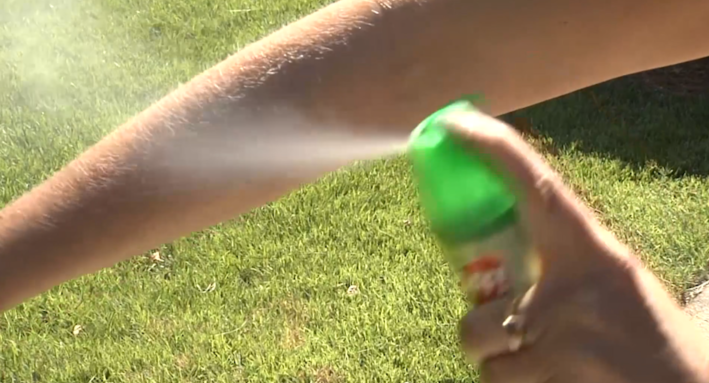Expert shares tips to avoid, treat bug bites this summer

By Jazmine Knight
After enjoying the great outdoors over Memorial Day weekend, some people might now be dealing with bug bites.
Here in the St. Joseph area, the biggest concerns are mosquitos and ticks.
Shelly Cox, a naturalist at the Remington Nature Center, said that with the increased rainfall recently, mosquitos will be popping up everywhere.
“This year, we’ve really been catching up on the rainfall that we needed. So we have a lot of standing water in various different places, and that’s just a breeding ground for mosquitoes,” Cox said.
Mosquitos tend to be attracted to the carbon dioxide humans exhale. However, only female mosquitoes can bite because they use the blood to produce eggs.
With bees, wasps and other stinging creatures, they’re mainly attracted to scents. Cologne, perfumes, lotions and body washes are all things that give off a strong scent to bees, and ultimately, it’ll make it easier for them to find you.
As far as ticks, getting bitten is just a random stroke of luck.
“If you’re traveling around or walking around in high grass, they’re just going to latch on to you and climb on to the nearest mammal that they can potentially attach to,” Cox said.
And if you happen to be unlucky, it’s important to take it seriously as they can transmit potentially deadly diseases.
“Wear long sleeves, long pants, maybe even tuck your pants into your socks, wear light colors,” Cox said. “The light colors aren’t going to necessarily repel the tick, but it’s going to make it easier for you to see a tick so you can get it off you.”
Spider bites are a different story. One common misconception is that spider bites are a huge danger that you should constantly be worried about. But after speaking with Cox, she debunks that rumor.
While many might be the most worried about spider bites and the dangers they can present, Cox said it shouldn’t necessarily be a huge concern.
“I don’t think they’re as big a problem as what we’re generally led to believe,” she said. “Yes, spider bites happen … but (the chance of the effects being detrimental is) really rare.”
In this region, black widows and brown recluse spiders will be common. However, only about 10% of the spider population carry necrosis-causing abilities or infections.
“Oftentimes when you go to the doctor with a mystery bite, it’s diagnosed as a spider bite when it might be any number of other things that bit you,” Cox said.
Putting hydrocortisone cream on bug bites can help reduce itching, and ice can reduce swelling. The worst thing you can do is scratch, Cox said.
“It’s just going to make it that much worse and make that itching last longer,” Cox said. “You might end up with a sore or an infection because of it.”
If you are bitten by a tick, it’s crucial that the head of the tick is removed. You can do so by using a pair of tweezers.
“Don’t try to burn it off with a match. I know people have tried that. You’re only going to burn yourself,” she said.
Another piece of advice is to keep a tick after you’ve removed it. Cox suggests taping it to a calendar on the day that you found it.
“And then within 10 days, if you don’t have any symptoms at all, you can throw that away,” she said. “But if you do start having some kind of symptoms, especially flu-like symptoms, you can take that to your doctor and be like, ‘Okay, here’s what I was bitten by’ and then get the proper treatments.”
You should seek medical attention when you start to notice a rash, swelling, flu-like symptoms or lethargy. For stinging insects, watch out for dizziness and lightheadedness or just not feeling well overall.
“That could be a sign that your body is transitioning into a position where it’s going to have anaphylactic reactions and that can be life-threatening,” Cox said.
For prevention, things like bug-repellent bracelets can be an option, but they need to be changed frequently in order to be effective.
“That insecticide that’s in those is going to wear off over time and they’re going to not work anymore,” Cox said.
You can also utilize citronella candles or mosquito coils to repel bugs from a certain area.
“Things like that around your campsite or maybe your backyard picnic or something will help kind of keep those mosquitoes away,” she said.
Another option is to buy clothing with insecticides already built in or purchase pyrethrins that you can apply to your clothes.
“Do not get them on your skin, but your clothes will be repellent to ticks and other insects for weeks and multiple washings,” Cox said.
But as far as your person, Cox said the best thing for her is using Deet. Deet is the active ingredient in most bug sprays or repellents. For Cox, that’s what gives her the most success.
Most importantly, always check yourself for any ticks, mosquitos or other insects and get them off as quickly as possible.



